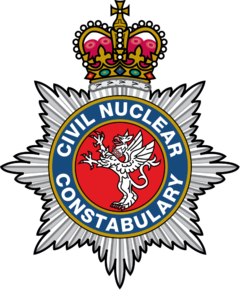Civil Nuclear Constabulary
 | |
The Civil Nuclear Constabulary (CNC) is a special armed police force funded by the nuclear industry and guards its installations across the UK. The CNC's 750-strong force is authorised to carry out covert intelligence operations against anti-nuclear protesters, one of its main targets.
The nuclear industry's funding comes from the companies which run 17 nuclear plants, including Dounreay in Caithness, Sellafield in Cumbria and Dungeness in Kent. Around a third is paid by the private consortium managing Sellafield, which is largely owned by American and French firms. Nearly a fifth of the funding is provided by British Energy, the privatised company owned by French firm EDF.
Most of the CNC's officers are armed with high-powered guns and Tasers and patrol outside nuclear plants, with their jurisdiction stretching to three miles beyond the perimeter of the installations. They have the same powers as any other British police officer and can, for instance, arrest and stop and search people.
The body that regulates the CNC is also funded by the nuclear industry. Four of the eight members of the Civil Nuclear Police Authority are nominated by the nuclear industry as its representatives. Those four are employed in the industry. The others – mainly former police officers – are deemed to be independent.
Ben Ayliffe, head of Greenpeace's anti-nuclear campaign, said:
- "There are very obvious worries about an armed police force that is accountable to an industry desperate to build nuclear reactors in the UK. This industry will probably be very keen for their police force to use all the powers available to them to prevent peaceful protests against nuclear power."
The job of the CNC is to protect civil nuclear plants and guard radioactive nuclear material when it is being transported by land, rail or sea to ensure it is not stolen or sabotaged. The industry also receives advice from the security services on how to protect itself from attack.
The CNC is authorised to send informers to infiltrate organisations and to conduct undercover surveillance under the Regulation of Investigatory Powers Act 2000 (RIPA). It is also permitted to obtain communications data such as phone numbers and email addresses.
Since 2007, the CNC has also been headed by an ex-intelligence official, rather than a police officer. Richard Thompson is reported to have been a senior officer in MI6 who "has extensive experience in the intelligence world, but has no previous police background".[1]